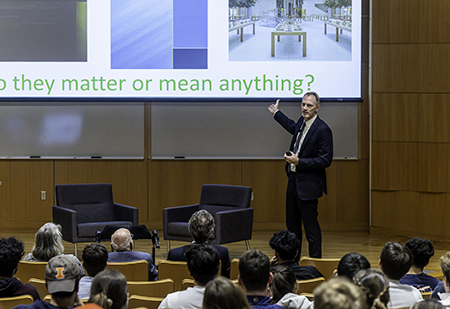Feb 14, 2024
Zackary Starbird: “It will always be a work in progress.”
Zackary Starbird opened the fall 2023 Leighton Lecture on Ethics and Leadership by posing this question to the audience: “If you want to make the world a better place, do you spend your time with the sinners or the saints?”
For Starbird, you may be more likely to have an impact when you spend your time with the people who need the help you can provide. As he put it, “The people who need your help are the people who don’t quite have it right.”

As Global Head of Ethics & Compliance for Trading & Shipping at bp, Starbird deals regularly with commodities traders to answer questions and set strategies for the best procedures for conducting business in an ethical manner. He sees his company as one that has lofty goals and aspirations for their ethical behavior, but the day-to-day realities of business and of people make it a place where he can have impact and help steer the course of the company toward ethical, compliant behavior – help them get it right.
Throughout his discussion, Starbird emphasized the importance of company culture – what a company aspires to and how those aspirations play out within the company. He pointed out that 99% of companies will have a code of conduct. “Do they mean anything?” he asked. “How do you know if they mean anything or matter?”
Starbird believes there are two things that matter for an organization’s culture: who you hire, and the incentives in your organization (what you reward or punish).
“I think culture is the most important thing for a company’s ethical compass. How it conducts itself and whether the words in the code of conduct mean anything,” he said. There are two approaches for ensuring that proper behavior is followed: carrots (rewards for doing what’s right) and sticks (punishments for doing what’s wrong). These are the approaches to incentives that companies can take.
There is a difficulty, though, in measuring and rewarding carrots (doing what’s right) because that would imply avoiding problems that therefore don’t occur. It’s what Starbird calls “the impossible task of rewarding what didn’t happen.” It is extremely difficult to recognize or quantify that some action directly led to avoiding a future problem. So the carrot – encouraging correct actions – will not be something you can reward with any sense of clarity or accuracy.
That leaves the stick – negative consequences for actions that are contrary to a company’s set practices and ethical practices. For the commodities traders at bp, Starbird leads the review of each trader’s actions annually. His review – should the trader be engaging in improper activities – can reduce an individual’s annual bonus. “I have come in and asked for 50% reduction, 75% reduction, 100% reduction on their bonuses,” Starbird said. “That’s a stick. And once the traders know you’re going to use that stick, you get a whole different set of focus and attention from them.”
At the same time, it’s important to foster an atmosphere of nonjudgment that encourages employees to discuss actions that they are considering. “As a compliance person, you want your people to feel that they can come to you and ask you questions. ‘Can we do X? Everyone else is doing it.’ As a compliance lawyer, you want people in your company to be comfortable coming to you and asking that question. Establishing credibility.”
By creating this foundation of trust, changes can be made to an employee’s actions. Starbird stated, “I joined a company that is a work in progress. It will always be a work in progress.” By being relevant and keeping themselves in the conversation, people in positions like Starbird can be a positive influence ever day for companies of all types.
About Zackary Starbird
Zackary is the Global Head of Ethics & Compliance for Trading & Shipping at bp. Previously he was the assistant general counsel responsible for bp's Americas-based commodities trading businesses. For the past 20 years he has been in and around commodities trading environments, providing legal support on a full array of commercial, regulatory, litigation, and bankruptcy issues.
In 2017, he worked in a commercial role as the distillates trading manager for bp in the Americas. In that role, he worked to enable commercial opportunities for the team that was trading jet, diesel, and heating oil. He also helped to ensure that trading occurred in a controlled and compliant manner.
Before coming to BP Zack worked in senior legal roles supporting the trading businesses of Koch Industries and Mirant Corp. Outside of work, Zack is a proud father of three and an avid reader and basketball player.
About the Leighton Lecture on Ethics and Leadership
In 1997, a generous contribution by alumni Richard and Grace Leighton established this lecture series. hosted annually by Gies College of Business and The Center of Professional Responsibility in Business and Society, these lectures bring in business leaders to share their experiences and expertise in the types of challenges they might encounter in their future careers. The leaders who present these lectures help students develop a deeper understanding of the ethical issues that can arise in a wide range of industries.
